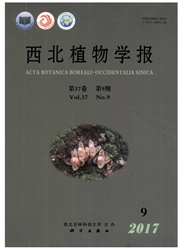

 中文摘要:
中文摘要:
以冷处理的大白菜幼叶为材料,采用RT-PCR技术获得1条新的冷相关基因序列(BpCOR,GenBank登录号DQ491005)。该基因编码129个氨基酸的亲水多肽,预测其N端含有叶绿体转运肽序列。多序列比对显示,Bc-COR蛋白与拟南芥及其它植物COR具有较高的相似性。Northern杂交结果显示BcCOR基因能被冷处理强烈诱导表达,而被脱水和盐处理弱诱导;在冷处理下,BcCORmRNA在根中的积累量低于叶片,光照能显著加强该基因在叶片中的表达。研究表明,BcCOR基因可能在大白菜抵抗冷胁迫和其它非生物胁迫的过程中具有重要的作用。
 英文摘要:
英文摘要:
A new cDNA encoding cold regulated protein(COR) was isolated from Chinese cabbage(Brassica pekinensis cv.Qinbai 5) and was designated as BpCOR(GenBank accession no.DQ491005).The cDNA contains a 390 bp open reading frame(ORF) encoding a hydrophilic polypeptide of 129 amino acids.Multiple alignments showed that BpCOR has high similarity with cold regulated genes from Arabidopsis thaliana(AtCOR15a) and other plants.The predicted BpCOR protein has a potential chloroplast signal sequence cleavage site.Northern blot analysis revealed that the expression of BpCOR was strongly induced by cold treatment,weekly induced by dehydration,but not responds to exogenous application of abscisic acid(ABA).Moreover,the mRNA level of BpCOR is higher in leaves than that in roots when plants were exposed to cold,suggesting that there is an organ specificity in BpCOR expression under cold stress.In addition,the accumulation of BpCOR mRNA is enhanced by light compared with darkness when seedlings were exposed to cold.It is concluded that the BpCOR protein may be involved in response to cold and other abiotic stress and that the expression of BpCOR might be associated with light signaling in B.pekinensis.
 同期刊论文项目
同期刊论文项目
 同项目期刊论文
同项目期刊论文
 期刊信息
期刊信息
